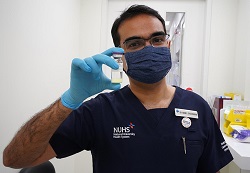
13 April 2021 - A widely available cancer drug could potentially be used to treat COVID-19, found researchers from the National University Cancer Institute, Singapore - NCIS and the Icahn School of Medicine at Mount Sinai in the United States.
The team found in pre-clinical trials that the drug, Topotecan, reduces the severity and death rate of SARS-CoV-2 infection by inhibiting the expression of inflammatory genes in lung models.
This could have potential implications for COVID-19 treatment in humans, said NCIS.
Topotecan is an inexpensive and widely-used cancer drug that has been used in oncology for over 25 years. It is available all around the world, and has a well-understood safety profile.
In addition, it is able to limit inflammation in the lungs even days after infection - an effect which no existing therapies have been shown to achieve.
This is important as people with moderate or severe COVID-19 often do not present to hospitals until many days after infection, said A/Prof Ivan Marazzi from Mount Sinai, who led the study.
Inflammation in the lungs, which occurs when the immune system responds excessively to infection, can lead to tissue damage and often death. By reducing this inflammatory state, the drug could improve the clinical outcomes of these patients, said NCIS.
The dose needed to treat COVID-19 inflammation is also lower than what is typically used in chemotherapy, reducing the likelihood of side effects caused by the drug.
The NCIS team has since secured a research grant, supported by the National Medical Research Council (NMRC) and the National Research Foundation Singapore, to conduct a phase 1 clinical trial of Topotecan in humans.
"The aim of the phase 1 study is to establish the lowest dose of Topotecan that can safely reduce COVID-19 inflammatory markers in patients," said Dr Anand Jeyasekharan, the study's co-author and Consultant and Asst Director of Research (Medical Oncology) at the Department of Haematology-Oncology at NCIS.
The trial is expected to last between three and six months, depending on how quickly suitable patients are recruited. If it is successful, a second phase will start, with a larger pool of patients recruited from different countries.
Dr Jeyasekharan added that this research is timely given the lack of universal access to vaccines.
"Repurposing of existing drugs represents a valuable global strategy for treating COVID-19," he said.
"Clinical trials such as the one we have set up with NMRC funding are a critical step in the process of assessing the potential of drugs for such use, with the possibility that they would eventually be proven helpful for use by patients in need across the world."


















